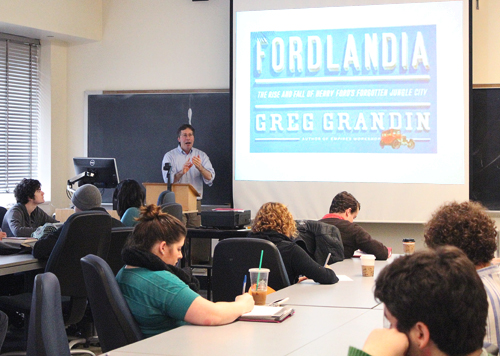
Stephen Frenkel, an assistant professor in the international studies department, recently took over the course “Amazon Rainforest.” He said that in most of his courses, whether it’s looking at issues of Central America, sub-Saharan Africa or the Amazon, he looks at the events that are going on today.
“My goal of the course is to say, ‘OK, what’s going on? Why are things the way they are today and how did they get to be that way?’” Frenkel said.
Frenkel enjoys lecturing in his class but welcomes discussion when students have questions. The course begins with a history of the Amazon and goes over geography. After that, the class begins discussions about structural processes that have led to the things happening today.
“I go through all the different contemporary issues, but they really range,” Frenkel said. “I’m also interested in the intersection between parts of the world.”
As an example of this intersection, Frenkel pointed to traditional cultural practices involving ayahuasca, a hallucinogen that comes from tropical plant extracts in the area.
“My interest is both looking at the traditional practice, [and] also how it has changed over time. And I’m interested in the case in [regard to] the way it intersects with tourists,” Frenkel said.
Historically, indigenous peoples of the Amazon have used the hallucinogen for spiritual and healing purposes, but now, many tourists travel to the Amazon just to partake in the hallucinogenic experience.
Frenkel uses these examples to ask the class questions about what’s going on, whether it’s good or bad and who benefits from it.
The course is available to anyone who is an international studies student, or anyone working toward their Global Perspectives junior cluster. There are no prerequisites, and Frenkel said the course is made up of a mixture of all sorts of students.
Before Frankel started teaching the course, fellow international studies professor Shawn Smallman taught the class. He could no longer teach the course after recently becoming the director of international studies.
“I think students really enjoy taking it because they are really interested in [the] topics that are covered,” Smallman said. “They are interested in some environmental issues, indigenous rights issues, social justice issues, and those are really core themes for the course.”

